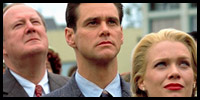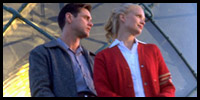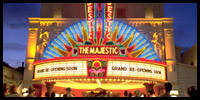
 |
The Majestic (2001) Directed by Frank Darabont Cast: Jim Carrey, Laurie Holden, Martin Landau, James Whitmore, David Ogden Stiers, Jeffrey DeMunn, Ron Rifkin, Catherine Dent, Susan Willis, Bob Balaban, Amanda Detmer, Hal Holbrook, Gerry Black, Daniel Von Bargen, Bruce Campbell 2001 – 152 minutes Rated: Reviewed by Dustin Putman, December 21, 2001.  Were it not for the sprinkling of brief profanity in "The Majestic," the new 1950s-set drama directed by Frank Darabont (1999's "The Green Mile"), the film could believably have been made fifty years ago without the batting of a single audience member's eyelash. If this were the actual case, taking over Jim Carrey and Darabont's roles would likely be James Stewart and Frank Capra (1946's "It's a Wonderful Life"). So old-fashioned in its deliberate pacing and storyline as to seem almost quaint in the present day, "The Majestic" remains a likable and well-acted enough excursion to avoid greatly testing one's patience once the oozy, overwrought melodrama sets in in the final act.
Were it not for the sprinkling of brief profanity in "The Majestic," the new 1950s-set drama directed by Frank Darabont (1999's "The Green Mile"), the film could believably have been made fifty years ago without the batting of a single audience member's eyelash. If this were the actual case, taking over Jim Carrey and Darabont's roles would likely be James Stewart and Frank Capra (1946's "It's a Wonderful Life"). So old-fashioned in its deliberate pacing and storyline as to seem almost quaint in the present day, "The Majestic" remains a likable and well-acted enough excursion to avoid greatly testing one's patience once the oozy, overwrought melodrama sets in in the final act.
At once a small-town slice-of-life, a romance, and a mystery, Jim Carrey (2000's "Me, Myself & Irene") stars as Peter Appleton, an up-and-coming screenwriter for Hollywood B-movies who finds his life at a crossroad when he is blacklisted for once attending a Communist Party convention when he was in college. At the time, Peter wasn't aware it was for communists and, truth be told, only attended to impress a girl he liked.  After a night of drinking as he wallows in self-pity, Peter is in a freak car accident that leaves him with a case of amnesia. Washing up on the shore of a small California town, he is soon recognized by aging citizen Harry (Martin Landau) as his long lost son Luke, who had been presumed dead at war nine years ago. Peter is a dead ringer for Luke, and because he does not remember anything about his previous life, he attempts to rekindle the relationships he thinks he used to have, including with headstrong, long-time girlfriend Adele Stanton (Laurie Holden).
After a night of drinking as he wallows in self-pity, Peter is in a freak car accident that leaves him with a case of amnesia. Washing up on the shore of a small California town, he is soon recognized by aging citizen Harry (Martin Landau) as his long lost son Luke, who had been presumed dead at war nine years ago. Peter is a dead ringer for Luke, and because he does not remember anything about his previous life, he attempts to rekindle the relationships he thinks he used to have, including with headstrong, long-time girlfriend Adele Stanton (Laurie Holden).
At a beefy 152 minutes, the plot thickens (and begins to drip) at the two-hour mark when Peter's old Hollywood life comes back to haunt him. Finding himself having to testify in front of Congress for his past involvement in communism, he must decide what to do based on the important things he has learned from the beautiful small-town life he has observed. The transgressive courtroom scene, while admirably performed by Carrey, quickly grows monotonous in its plea for artificial, feel-good sentiment.  Written by Michael Sloane, "The Majestic" takes its name from the closed-down movie theater Harry and Peter decide to renovate and reopen. While the theater does not play a major role in the story, it is the catalyst used for Peter's rediscovery of his love for movies. There may be three too many swooping shots of the colorful, lit-up billboard outside the theater, but it gets the job done.
Written by Michael Sloane, "The Majestic" takes its name from the closed-down movie theater Harry and Peter decide to renovate and reopen. While the theater does not play a major role in the story, it is the catalyst used for Peter's rediscovery of his love for movies. There may be three too many swooping shots of the colorful, lit-up billboard outside the theater, but it gets the job done.
If the tone of the film tends to lean toward mawkishness in the last half-hour, what is appealing about "The Majestic" is its almost-stubborn yearning to be like the motion pictures of yesteryear, where violence wasn't graphic, the characters didn't curse like sailors, and the most romantic thing between two people was a look, or a simple kiss. Director Darabont does a fine job in portraying the moralistic values of the town's citizens, as well as the life-altering effect they have on Peter/Luke.  In his first film since 1989's superb telefilm, "Doing Time on Maple Drive," where he has not shown a solitary sign of his comedic roots, Jim Carrey turns in a superior performance far stronger than anyone could have predicted. In Peter, Carrey has finally found the ultimate gateway from being merely funny to being a serious everyman, along the lines of Tom Hanks. Martin Landau (2000's "Ready to Rumble"), as the fatherly Harry, hasn't been given such a meaty part since 1994's "Ed Wood," and he is more than up to the challenge. And newcomer Laurie Holden, as determined law student Adele, has a soulful face which she puts to good use in expressing the thoughts and feelings her character is having as she deals with her true love finally returning to her life--if he is, in fact, the same person.
In his first film since 1989's superb telefilm, "Doing Time on Maple Drive," where he has not shown a solitary sign of his comedic roots, Jim Carrey turns in a superior performance far stronger than anyone could have predicted. In Peter, Carrey has finally found the ultimate gateway from being merely funny to being a serious everyman, along the lines of Tom Hanks. Martin Landau (2000's "Ready to Rumble"), as the fatherly Harry, hasn't been given such a meaty part since 1994's "Ed Wood," and he is more than up to the challenge. And newcomer Laurie Holden, as determined law student Adele, has a soulful face which she puts to good use in expressing the thoughts and feelings her character is having as she deals with her true love finally returning to her life--if he is, in fact, the same person.
On the basis of the truthful writing and top-notch acting, "The Majestic" is a solid drama worth a look. The loud orchestral music score, by Mark Isham (2001's "Don't Say a Word"), threatens to drown out some of the dialogue, but the cinematography of the California shore, by David Tattersall (1999's "Star Wars: Episode 1--The Phantom Menace"), is effervescently idyllic. It aids in representing the harmless idealism director Darabont brings to his view of the early 1950s. It may not be particularly realistic, but it doesn't hurt to wish things had been this way. ©2001 by Dustin Putman |
 |













